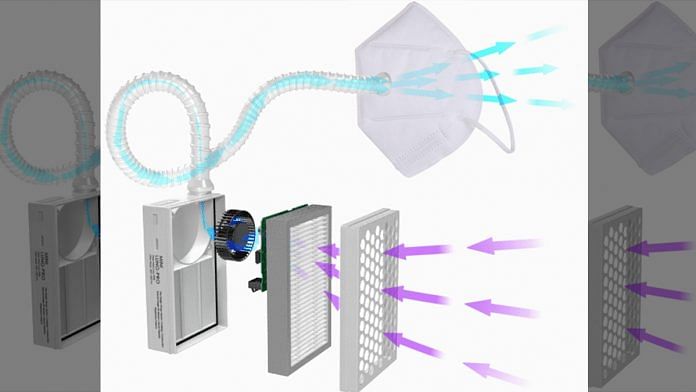New Delhi: With studies indicating that Covid-19 is more likely to spread through aerosols than contact transmission, researchers from the US have found “a more perfect mask” that protects one from aerosol transmission.
According to two professors from Princeton University, Shivaji L. Sondhi and Howard A. Stone, and physicist Richard L. Garwin, the powered air-purifying respirator (PAPR) devices offer the most effective protection against Covid-19 aerosols, especially in a poorly ventilated room where other measures like social distancing are futile.
The three researchers refer to PAPR devices as the “gold standard of protection in medical and pharmaceutical settings”.
“Wearing a PAPR you could be equally safe for 25 times longer than when wearing a cloth mask. In settings involving shared spaces — transport, shopping, professional visits, and social visits — PAPR usage could return life to near normal for people without symptomatic disease,” the researchers noted in an email to ThePrint.
According to Sondhi, professor of Physics at Princeton University, people will be inclined to use the PAPR devices because of their ease of use.
“Once you put them together they can be used for long periods without further tweaking. The filters are rated for about 500 hours. Even at 50 hours of usage a week that takes you to 10 weeks before you need to change it … The masks only need to be changed when they get dirty or there is serious risk of their being contaminated,” he told ThePrint.
He added: “I think the main thing is to realise that one should compare these to ordinary masks and in that comparison they come out way ahead.”
While initially it was unclear how SARS-CoV-2 spread, overwhelming scientific evidence has pointed out that the virus is more likelier to spread through airborne transmission than by surface contact.
Furthermore, people who are infected and are asymptomatic can infect others through aerosols, and as a result, in a poorly ventilated room, social distancing is of little use. In open spaces, social distancing works because the aerosols are dispersed by fresh air.
Also read: ‘Worrying’, says govt as 5 cases of South Africa, Brazil Covid variants detected in India
What are PAPR devices and how they work
The PAPR device was designed and created by William Burgess between 1967 and 1968. Burgess submitted a proposal to the American Iron and Steel Institute to design powered air-purifying respirators to be used in coke ovens at steel plants.
This was because many people working in coke ovens were developing lung cancer at 10 times the normal rate due to clouds of contaminated coal. Burgess created a PAPR with filters and small fans that were powered by motors with batteries, which were connected to a mask. This device is believed to have worked for at least eight hours.
Today’s PAPR uses a fan to push air through a HEPA filter (that filters our particulate matter) into an N95 mask. A tube connects the filter, which includes the fan, to the mask.
The battery-run device comes with a USB cord and can be recharged.
According to the researchers, the PAPR filters air much better than any other mask and provides a supply of fresh air. They added that this respirator works better than just N95 masks and more than 98 per cent aerosols are filtered out by it.
Sondhi highlighted that in a PAPR, the air is forced inside as higher pressure is created through the filter. As a result, the air one breathes through the N95 mask comes through the filter, he explained. Furthermore, there are different levels for the fan which can be used to speed up the rate at which the air is filtered through the HEPA filter.
The professor noted that health authorities can raise awareness about these devices by issuing guidance after testing them directly.
“If, say, the Indian government was to invite tenders for 10 million units at a sensible price, that would give potential manufacturers in India and elsewhere an incentive to supply them. The government could recoup the cost by selling them. Even better, once word gets around, private distributors will pick up the units directly from the firms making them and the government will not need to get involved at all,” Sondhi told ThePrint.
One such PAPR is the Broad Airpro Mask that is available on Amazon, which costs $60-$67 (approximately Rs 4,300-Rs 4,500).
The Broad Airpro Mask has a USB rechargeable battery that powers a respirator with a 10-hour run time and the HEPA filter can be used for a total of 500 hours. Other brands with similar features include 3M and Bilang.
Also read: Israel bars Sputnik V entry into Gaza, Japan’s syringe challenge & other global Covid news



